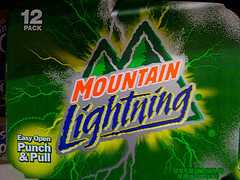Is Brand Perception Tricking Our Brains Into Not Thinking About What We’re Tasting?
The study, recently published in the journal PLOS ONE, looked at test subjects brain activity with regard to various brands of soda (or cola, or coke, or pop).
Subjects were presented with small samples of a beverage and were told before drinking each that it was either Coca-Cola, Pepsi, generic German soda River Cola, and a new (completely fictional) drink they dubbed T-Cola. The subjects did not know that each of the samples contained exactly the same thing, a mixture of the three beverages.
It’s no surprise that subjects generally responded more favorably when they were told they were drinking a Coke or a Pepsi. But what is interesting is what was revealed by fMRI scans of subjects’ brains as they processed the brand names and evaluated each sample.
When subjects were told they would be tasting a River Cola — which doesn’t advertise and doesn’t have the brand cachet of Coke or Pepsi — or T-Cola (which doesn’t exist), the scans detected a higher level of activity in the medial orbitofrontal cortex (mOFC), which scientists believe is involved in making value judgements about new items.
“[T]he present findings may indicate that participants rely on stimulus values encoded in mOFC more strongly whenever weak brands do not offer sufficient guidance to decide about the drinks pleasantness,” write the researchers. “When on the other hand a strong brand is expected, this strong brand cue overrides elaborate processing of stimulus value in mOFC, since the brand is well known and its associations can be easily retrieved without an additional assessment of the subjective stimulus value.”
Additionally, those subjects told they were tasting Pepsi or Coke showed a higher level of activity in the left ventral striatum, which is associated with the person receiving some sort of reward. And so these tests, which were only performed on a small group of subjects, might be seen as an indication that brand awareness stops humans from digging deep into that part of the brain that susses out alien things.
“Taken together the present results show the strong effects of brand cues on self-reported pleasantness as well as on neural responses signalling reward in the brain,” conclude the researchers.
Want more consumer news? Visit our parent organization, Consumer Reports, for the latest on scams, recalls, and other consumer issues.


